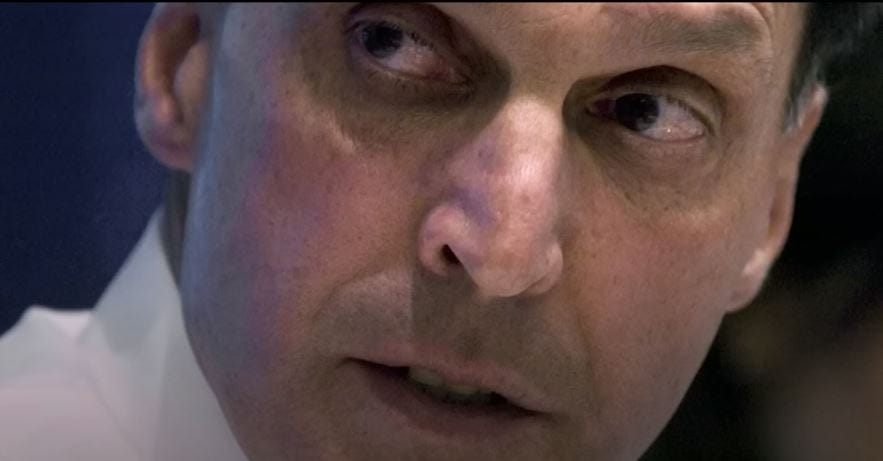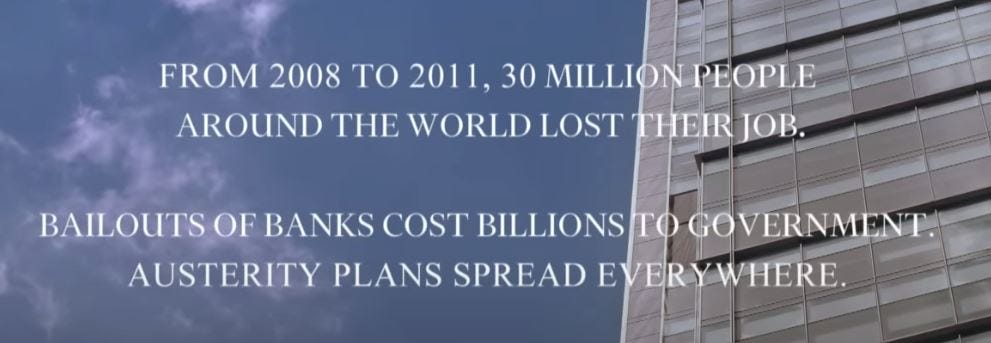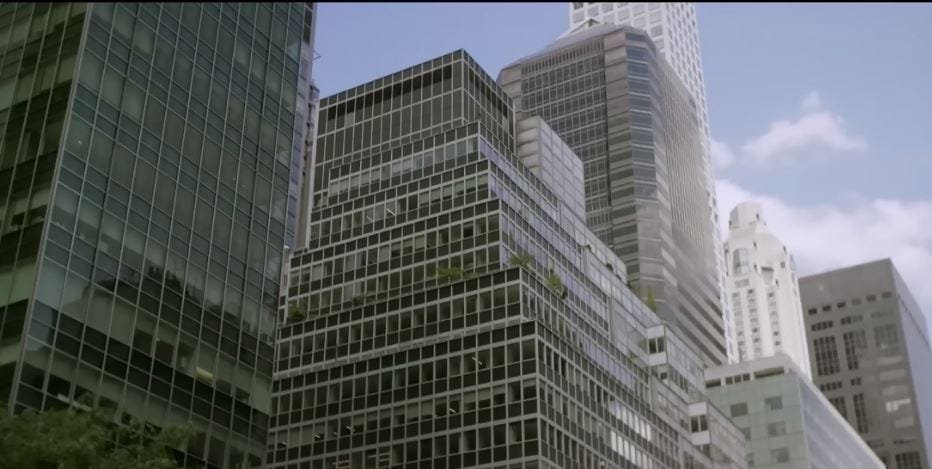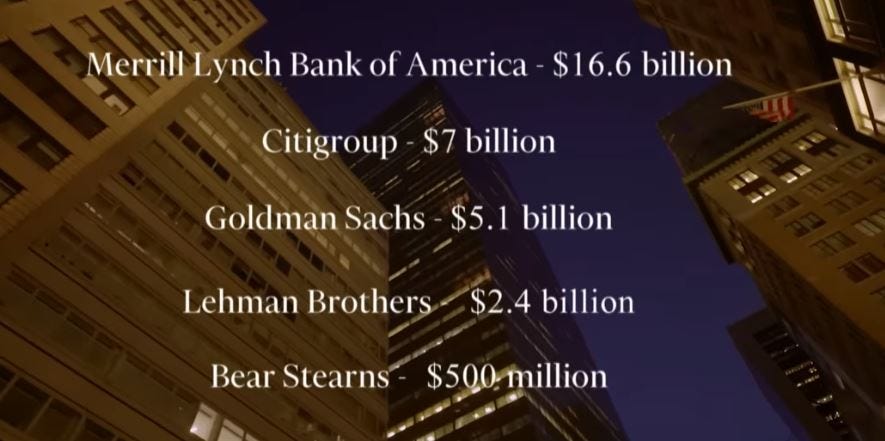The Men Who Stole the World (and got away with it)
'The world's collapsed. There were trillions of dollars of damage. It didn't cost Dick Fuld a dollar.' Oliver Budde, fmr Lehman Brothers Associate General Counsel
‘I want to speak out because of what I saw.’ Philip James Baker, fmr high flier & founder, Lake Shore hedge fund firm
Vital Viewing
The Men Who Stole the World (and got away with it)
May 29, 2024
They're bankers, traders, investment funds executives. They forgot all about morality to make money. The entire world had to suffer the consequences of their actions. They impoverished countries, drove millions of workers into unemployment, and contributed to the rise in extremism. So who are they? And, after the 2008 crisis, were the real culprits condemned? Could there be another?
Benoît Bringer, Director
(Run time: 55 mins)
We have shown that we the public and decision makers basically haven't learned because we never much understood the crisis. But the bankers have learned the lessons and the lesson was: This is sweet. This is perfect. This is a sure thing. I will be fabulously wealthy and I will not pay any price for it. Thank you, Lord.
Anton R Valukas - fmr US Attorney, Lehman Brothers Bankruptcy Examiner
Transcript Excerpts
Philip James Baker: I've been on the top, I've been behind bars. I know what it is to be called a financial criminal. I admit my guilt but now I'm free and I want to speak out because of what I saw. Because I've been there.
I can tell that if we do nothing, everything can happen again. They had no consequence. The titans of Wall Street basically face nothing. For my life, I went to prison. Some people would say, well you know what? You did wrong. It's fair. It's just. The argument could be, I agree but what about the people and the titans of Wall Street.
…The business started in the basement of my parents and this company grew to be a billion dollar company.
David Enrich, Financial Editor, New York Times: Lake Shore was a hedge fund firm. Philip Baker set up a hedge fund that was designed to trade in Commodities, so prices of oil, coal, things like that. He was a marketer. He was the client guy. He was the one who would go out to wealthy individuals or institutions and get them to put their money with Lakes Shore
Philip James Baker: Our clients were Global investment Banks from around the world. Goldman Sachs, Royal Bank of Canada, Canadian Imperial Bank of Commerce, HSBC, Bank of Nova Scotia Credit Swiss, UBS so that's quite a list. We operated in close to 40 different countries around the world. Brazil, Peru, Panama, Colombia, Japan, Taiwan, Hong Kong obviously throughout Europe.
The marketing and business development was based in London so I was based in Mayfair which is the hedge fund capital of the world… It was a life of luxury. Having a butler. Not worried about expenses of anything. Everything I ever wanted, I could have. I sponsored an ocean racing team competing against Hugo Boss, UBS and that was just for fun.
… We were making millions per month. Offshore accounts. Not paying taxes. I was living a dream. Weren't worried about anything. But in my particular instance, I had something to worry about.
David Enrich, Financial Editor, New York Times: All sorts of investors all over the world were very eager to put their money with them because he was generating very good returns and that's what investors want. He turned out to be doing something else, which was, he was misappropriating the investors money and the investors thought they were achieving these excellent returns. In reality, they were not. Philip Baker and his partners were essentially making it up. They were lying.
The second thing, and in some ways the more damaging issue, is that as they sought to recruit additional investors, new investors, which were essential because they needed to paper over the money that they'd already lost, they were in their prospectuses in the documents that they provided to investors to show investors how well they'd been doing. They were lying there, too, and they were saying, instead of having lost 50% of their Assets in the first year, they were saying, oh look at us, we've got this long track record of very impressive returns.
They were lying not only about the returns but they were lying about the longevity of the fund. So they were saying they had, I believe a 14-year track record, which just wasn't true. They had not been trading for 14 years.
Philip James Baker: Trading results were falsely reported and hence that was a fraud. You cannot do that. One penny not reported properly, is wrong.
David Enrich, Financial Editor, New York Times: The victims were everyone who had invested with him. Investors who lost their money… investors who put their money in after the initial fraud had occurred. And so, there were hundreds of millions of dollars that vanished as a result of this.
Philip James Baker: I've been asked why did I break the line? I wanted to protect what I had. Money, family, power. Everybody does that, don't they?… How many people say, no, I don't want the power I don't want the money and walk away?
William Baker (Father): We had to accept that he had made a a terrible mistake and… there was a penalty for making that mistake. And… that'll be something he'll have to live with the rest of his life.
Benoît Bringer, Director: Would you say that you are white collar criminal?
Philip James Baker: Yes. It's very interesting when you see your name, Philip James Baker versus the United States of America. It's overwhelming. Then you face the Assistant US Attorney as he's looking you in the eye. And when you go through that circumstance, there are no words that really can describe the depths of the loneliness you feel at that moment. I ultimately completed a plea deal with the United States government. I was sentenced to 20 years for wire fraud. ($294M fraud - 900 investors)
There's no way to really describe the process and the life of when you're held in a maximum security pre-trial Federal Institution in the United States. You have gangs. You have gangs amongst the gangs. You have violent offenders. There is no separation between a white collar criminal and very hardened criminals. They're all put together. There is no explanation for the world that you are left to enter. It's about survival. The days just come and they go. Becomes the routine of doing nothing. You have no hope. You have absolutely no future and you have no reason to continue. No reason to look forward.
David Enrich, Financial Editor, New York Times: Phil Baker is a criminal. Is he the type of financial Mastermind that caused the financial crisis? Absolutely not. This is a guy who is was not very sophisticated about his crime was not very malicious about his crime but he admitted that he committed a crime.
This is a classic example of where the justice department takes a shortcut. They want to generate publicity for themselves as going after financial crooks and everyone wants them to do that and yet time and time again, the people that they're going after are these little minnows. They're not going after the big fish. They're not going after the bankers. For the most part, they're certainly not going after the senior executives at the banks or other big financial institutions that were the decision makers leading up to the financial crisis.
Philip James Baker: 10 years after the financial crisis, except Iceland, how many white color criminals are behind bars? Kareem Serageldin from Credit Suisse. He's the only banker of Wall Street to go to jail related to the crisis. He lost just a few million. Not really big fish. Not a true Al Capone.
Could you tell me only one big bank top executive name? Here are the number of people convicted of crimes linked to the crisis in the US, according to the Financial Times. 324 people from Main Street.
Zero Wall Street chief executives have been to prison. Even though there is today, absolutely no doubt that Wall Street executives and politicians were complicit in creating the crisis.
It all started with allowing everyone to own a home
Philip James Baker: This is the story of how massive Global Banks made billions by packaging toxic mortgage loans and financial products and sold them all around the world. The American politicians pulled the trigger it all started with the political, philosophical grand ambition of allowing everyone to own a home.
President George Bush: Our government is supporting homeownership because it is good for America. It is good for our families. It is good for our economy. Part of the American dream that was pushed by, you know, all sorts of presidents. Clinton. Bush. Whatever. For years.
Philip James Baker: Home ownership authorities kept interest rates very low in order to make money very easy to borrow. Wall Street and politicians had agreed to work together. Wall Street with the pursuit of profits. The politicians with the pursuit of government interference on economic growth, which could be turned into election victories for years to come. This was the beginning of the housing bubble.
William K Black, White Collar Criminologist: When the bubble’s expanding, everybody is a winner. Everybody is a genius. The lenders make money. The real estate development companies make money. The construction workers make money. Everybody loves a bubble but this was a devil's deal between politicians and Wall Street. The setting to a perfect storm.
Martin Wolfe, Chief Economics Commentator, Financial Times: What happens in a boom, is lenders take more and more risk and borrowers take more and more risk because they both think things are safer than they appear to be. And one of the ways they persuade themselves to take more risk, is through financial innovations.
Philip James Baker: Wall Street created the risky loans called subprime to Americans who could ill afford to pay the bank loans that they had just applied for. The public were given access to zero low income and even no job loans.
William K Black, White Collar Criminologist: So, if you wanted the absolute craziness, it would be the ninja loan. So, ninja stands for no income no job and no assets, so the idea is that you would lend money to people that gave you no information about whether they had any income, whether they had any job, or they had any assets. It will allow you to grow enormously because now you can loan, in the US context, to tens of millions of people that can't repay the loan…
In these circumstances, this goes under the general category of predation. In the United States, the people that were targeted for the worst loans were overwhelmingly a combination of the four demographic factors: black, Latinos, the elderly and females. That is incredibly immoral this is why almost everywhere in the world these things are…crimes.
Philip James Baker: These toxic loans became a gold rush for the whole US Banking and Financial industry. All the major actors of Wall Street wanted a piece of Subprime: Goldman Sachs, Lehman Brothers, Morgan Stanley, Merrill Lynch, Bear Sterns, JP Morgan, City Group and so on.
The frenzy extended itself when loans were sought by the public by falsifying their own financial situation on loan applications. Therefore, the public and banks were complicit in committing bank fraud.
Richard Bowen, Senior VP and Business Chief Underwriter, City Group: It was my responsibility to make sure that the 90 billion a year that we were purchasing in mortgage loans that were originated by other Banks and mortgage companies, these met our policy standards. In early 2006, I discovered that over 60% of these mortgages did not meet our guidelines they were by definition defective.
When I discovered this… this was June of 2006, silly me, I thought it was my job. I started issuing warnings because I was supposed to make sure that these met our policy guidelines and I sent emails. I put it in my weekly report. I made committee presentations. I mean, I'm not a shy guy. I cornered people in the hallways at the water fountain and everyone say yeah yeah, we know we need to fix that but nothing would happen. And through 2006 and 2007, the volumes kept increasing and the rate of defective mortgages increased from 60 to an excess of 80%.
80% of these mortgages that we were in turn selling and giving our representations and warranties that met our policy guidelines, did not meet our policy guidelines.
Benoît Bringer, Director: This is misrepresentation.
Richard Bowen, Senior VP and Business Chief Underwriter, City Group: That is true. As a matter of fact, it was fraud. I've seen plenty of… documents with my own eyes that were falsified and the borrowers still signed them as if they were correct. People who were typically hairdressers gardeners and such, reporting incomes of over $100,000 a year. Now their actual incomes would be in the range of about 16,000.
In those cases, their income is inflated by six times. You would have waiters in a restaurant showing that they made $150,000 a year. I mean that clearly is out of line but nonetheless the loan type permitted that to happen.
….November the 2nd of 2007, sitting at my kitchen table, I put together an email and I sent the email to Robert Ruby who the next day, on Sunday at the board meeting, was named chairman of the board. I also sent it to the chief risk officer the chief financial officer and the chief auditor.
I said: URGENT. READ IMMEDIATELY. FINANCIAL ISSUES. I put that in all capital letters. I call for an outside investigation. I said, come in here from the outside and investigate what is is going on here because everybody here already knows. And no one contacted me throughout November throughout December. there was no contact. No one said a word.
I will tell you that that particular point in time, before I would even get in my car, I was doing what they do in the movies. I was looking underneath my car and opening the hood and looking. It was a very frightening time.
February the 6th, I received… there was an email that went out with regard to reorganization and in that reorganization, I was stripped of all my underwriting responsibilities. That next week, I was put on an administrative leave and told I'm not to come back to the bank. Greed was definitely the driver on all of this as it is on most fraud. I'm told City group was not the only one.
A comparable level of fraudulent mortgage loans have been seen in all the Big Wall Street Banks. Ignoring the risk of bankruptcy, banks began to borrow a mass amount of money to buy more and more mortgage loans and package them into derivatives.
The top underwriter in the peak years of 2005 and 2006 was Lehman Brothers. At $106 billion, Leman was one of the largest makers and sellers of the absolute, most toxic loans in the entire world. Lehman Brothers was one of the largest fraud vectors in the history of the world.
Anton R Valukas - fmr US Attorney, Lehman Brothers Bankruptcy Examiner: In the year 2009, about 3 months after the Lehman bankruptcy, I was appointed by the federal court in New York to act as an examiner.
I was independent of any of the parties and among the responsibilities the court charged me and my team with was to determine how and why Lehman went into bankruptcy. And when you're talking about the Lehman bankruptcy, you are talking about the largest single bankruptcy in the history of financial institutions. Total amount of the bankruptcy $693 billion. So we told the story of what happened.
Philip James Baker: Lehman brothers were the fourth largest global investment bank in the world led by famous CEO Dick Fuld (pictured below).
Benoît Bringer, Director: If I tell you Dick Fuld, what would be the first thing that crosses your mind?
Anton R Valukas - fmr US Attorney, Lehman Brothers Bankruptcy Examiner: A person who was viewed as a lion on Wall Street. I believe that in the year 2008 the very year of the bankruptcy, was named by Forbes is one of the top 10 Executives in the country.
William D Cohan, Senior Wall Street Banker, Author: “Wall Street: Money and Power”: They called him the gorilla and I think they called him that for a reason. He was brusque, boorish, take no prisoners kind of guy, you know, run through a wall for Lehman Brothers, hyper competitive, hyper narcissistic.
Dick Fuld, CEO, Lehman Brothers (Internal video 2007): Squeeze some of those shorts squeeze them hard. Not that I want to hurt him. Don't get that please, cuz that's just not who I am. I am soft. I'm lovable. But what I really want to do is, I want to reach in rip out their heart and eat it before they die.
William D Cohan, Senior Wall Street Banker, Author: “Wall Street: Money and Power”: The man who lost Lehman Brothers. The man who presided over its decline and fall. The man who could have done something about it but chose not to. The man who refused to see the writing on the wall. The man who, you know, kicked off in many ways, what became the Great Recession.
Philip James Baker…15th of September 2008, Lehman Brothers goes bankrupt. The New York Stock Exchange had its biggest drop in a single day since 911. Banks began to stop lending money to each other.
(News grab) The collapse of Leman Brothers triggered turmoil in markets around the globe. Stocks tumbled in Taiwan and India then plummeted in Europe.
The 2008 financial crisis displayed what the world now identifies as financial contagion.
Anton R Valukas - fmr US Attorney, Lehman Brothers Bankruptcy Examiner: There was a worldwide recession…he value of real estate plummeted, people lost their homes. You could go through Southwest side of Chicago and see foreclosure, foreclosure, foreclosure. Home after home after home that were going belly up. As a result of that, numerous businesses went out of business
William K Black, White Collar Criminologist: This is a fraud. This is not random. It's not oops.
Philip James Baker: Everybody got hurt. I mean, the impact across the world was measured into trillions of dollars. The value of what was lost during that period of time is almost incalculable we had never seen anything like that since 1929.
Philip James Baker: None of the leading company Executives were ever brought to justice. I lost everything. All the money. Everything I had. My wife. My family connections. I lost everything. I still owe money to the US government. I have 154 million reasons to know what I did wrong.
Benoît Bringer, Director: You owe how much?
Philip James Baker: 54 million. Plus interest. I'm just a small fish and I was brought to justice. they all went free. the system is is what it is and until the system changes, the powerful continue to walk.
Richard Bowen, Senior VP and Business Chief Underwriter, City Group: You've seen that there were some very large settlements that were made but they never admitted that they did anything wrong. There was no admission of guilt. There was no charge of any any criminal activity.
And I have always represented that those payments were nothing more than payments of extortion to the Department of Justice to seal the evidence. To lock up the evidence so the public would never see how widespread and pervasive the fraud was that was committed. And I truly believe that.
William K Black, White Collar Criminologist: These crimes are so vastly larger than any blue collar crimes. It's just off the charts, noncomparable in terms of these things. It’s what Balzac actually said: Behind every fortune that you can't explain, lies not just a fraud but one a a fraud executed so well, that it wasn't prosecuted.
Oliver Budde, fmr Lehman Brothers Associate General Counsel: You're now in Midtown Manhattan on Park Avenue. This is… where Lehman was after 911. And this building across the street (picture above) is where Dick Fuld the CEO is working today in his new company Matrix Capital.
Nothing has changed. He's in the same business he always was. Some people may think of him as some sort of, you know, guy that was banished forever. But no, he is just fine.
The world's collapsed. There were trillions of dollars of damage. It didn't cost Dick Fuld a dollar. The man put $550 million into his pocket. He kept it all and presumably he's probably grown that pile quite considerably. Perhaps he has a billion by now. The stock market has been doing very well since the crisis.
Benoît Bringer, Director: What is the difference between a gangster who robs a bank and this banker?
William K Black, White Collar Criminologist: Oh, the gangster that robs a bank a gets an average of about $2,000… is virtually always successfully prosecuted and …spends 20 years in prison. And the CEO has none of those things happen and is immensely wealthy and gets to keep his reputation.
Philip James Baker: Prison was the beginning of the Redemption. The judge told me do something good with your life and that's why I'm trying to make a difference by speaking to the public about my failures and how that they can be aware of what the world is facing.
Anton R Valukas - fmr US Attorney, Lehman Brothers Bankruptcy Examiner: Do I think it can happen again?… I think that's yes, I do. The seeds of the next financial crisis have already been planted. They're growing. We can't see them yet. But there are plenty of signs all around of trouble brewing.
I think there is no doubt that we are going into another crisis of a greater severity than we have just been through. I can't predict what the instruments are going to be. I can't predict the specifics but I know it will be driven by greed. And misbehavior has no consequence.
We have shown that we the public and decision makers basically haven't learned because we never much understood the crisis. But the bankers have learned the lessons and the lesson was: This is sweet. This is perfect. This is a sure thing. I will be fabulously wealthy and I will not pay any price for it. Thank you, Lord.
Until next time.
You've seen that there were some very large settlements that were made but they never admitted that they did anything wrong. There was no admission of guilt. There was no charge of any any criminal activity.
And I have always represented that those payments were nothing more than payments of extortion to the Department of Justice to seal the evidence. To lock up the evidence so the public would never see how widespread and pervasive the fraud was that was committed. And I truly believe that.
~ Richard Bowen, fmr. Senior VP and Business Chief Underwriter, City Group (at the time, City group was the largest bank in the world.)












